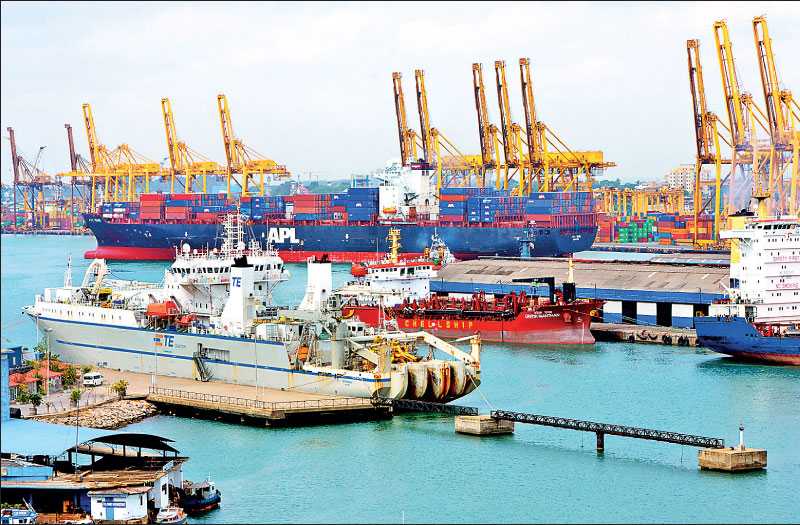Monday Feb 16, 2026
Monday Feb 16, 2026
Monday, 19 October 2020 00:01 - - {{hitsCtrl.values.hits}}

Logistics plays a vital role in providing services to the local economy and the international trading environment to keep the economy running. Therefore, it is always vital have a National Logistics Plan in action when a situation such as today arises – Pic by Shehan Gunasekara
By Sri Lanka Logistics and Freight Forwarders’ Association
 It is well over six months since the pandemic was officially announced by the WHO. Almost all countries have felt the impact of COVID-19, affecting trade and services and the global economic output. In fact, we’ve seen second waves and third waves. Now countries are taking different views, adopting a realistic approach while the scientific community is on a race for a possible vaccine.
It is well over six months since the pandemic was officially announced by the WHO. Almost all countries have felt the impact of COVID-19, affecting trade and services and the global economic output. In fact, we’ve seen second waves and third waves. Now countries are taking different views, adopting a realistic approach while the scientific community is on a race for a possible vaccine.
However, most countries are now opening trade corridors and adapting a more balanced approach to stop economies coming into a standstill. Even severely affected countries such as the United States, UK, Europe are now keeping airports open and trade corridors running. Even India has opened 17 travel bubbles to facilitate business travellers with less cumbersome quarantine measures. Japan, New Zealand, Australia, and Singapore are also taking more practical approach to restart economic activity, whilst accepting the reality of the COVID-19 pandemic.
The Sri Lanka Logistics and Freight Forwarders Association (SLFFA) is of the view, that with this second serious outbreak in Sri Lanka we too need to take a pragmatic action to ensure that both public and private sector services are facilitated and take a balanced approach and run the economy to avoid a total stoppage of work that will severely impact the Sri Lankan economy.
We call upon the Government to create guidelines not only for one or two sectors, but to all players in the supply chain on how they should provide services and call the industry to come up with their own solutions that could be introduced as a standard operating procedure (SOP) at a time of crisis to minimise the disruption of trade and services.
SLFFA is of the opinion that there are labour intensive industries which involves factories that are into production of merchandise. At the same time there are services that could immediately shift into digital platforms. Therefore, authorities such as the Finance Ministry, Ministry of Trade, Ministries of Shipping and Transport should all develop sector specific operational guidelines to facilitate services across the supply chains.
It is not only the responsibility of the Export Development Board (EDB) or the Board of Investment (BOI), but a collective effort has to be made to face such situations that would occur again and again as the pandemic situation will continue in the foreseeable future.
It is also the responsibility of the media and the chambers to educate the population and businesses with the right facts and the right spirit to ensure the county’s stability is maintained during such a volatile situation. The Government should also be transparent and accountable for the measures it takes and give confidence to the people by accepting the reality and provide solutions that are more practical by talking to cross sections of the industry and participants of the economy.
Logistics plays a vital role in providing services to the local economy and the international trading environment to keep the economy running. Therefore, it is always vital have a National Logistics Plan in action when a situation such as today arises. Further, the Government should prioritise the initiative of Single Window platform which will provide real value as well as will support the trade in long term basis. The local industry too needs to come up with innovative solutions to services for the country and its people.
The current acceleration of COVID-19 in the Gampaha District is an eye-opener for both the private and public sector. What is important is not the blame game but to find practical measure to overcome this situation.
The district is important for logistics. It houses many factories, Free Trade Zones, the busiest airport, container freight stations, warehouses among the biggest population in the country. Therefore, shutting down of this district will have a direct and an indirect impact for the rest of the country’s trade and supply chains as well.
SLFFA suggests continuous aggressive testing and educating the industry workers and the population in general on maximum precautionary measures through best practices introduced by the WHO and the local health authorities.
The Government and the private sector need to work extremely closely to ensure that the production bases are allowed to run at least in the range of 50%-75% so that export industry sustainability can be maintained even in such challenging circumstances.
It is our view at SLFFA that Sri Lanka is not in a position to be able to undergo further lockdowns but introduce best practices to the working environment using technology, labour flexibility and increase shift systems along with a structured public transportation system.
We as an industry feels that connectivity and logistics are Sri Lanka’s advantage in the global trading map. The COVID-19 pandemic has given us new ways to think and new opportunities. It is not only an eye-opener, but certainly a message to restructure supply chains and management processes to face the new reality that has advanced due to the pandemic itself.
If our industries can mitigate and navigate with creativity, it will give positive signals to the world and international investors. Therefore, SLFFA takes up the position that the COVID-19 pandemic will remain a challenge for the medium and long term and as a nation we need to adjust to this reality and capitalise on the opportunities that are on our way, which includes attracting new businesses to create a global distribution hub and this is the best opportunity to showcase, Sri Lanka’s resilience and adaptability in the business front.